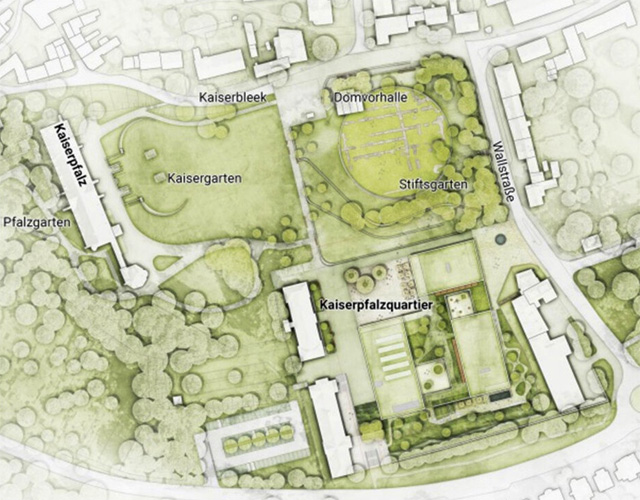Press Releases
Zur Auseinandersetzung um das Projekt Kaiserpfalzquartier in Goslar und die heutige Stellungnahme der Stadt erklärt World Heritage Watch:
Berlin, 5. April 2024
1.) In unserer Presseerklärung vom 3. April haben wir uns sachlich zu drei Punkten geäußert und unserer Verwunderung darüber Ausdruck gegeben, dass diese nicht von der Jury der Architektenwettbewerbe berücksichtigt wurden. Die Kommunikation mit dem UNESCO-Welterbezentrum und seiner Beraterorganisation ICOMOS International war nicht Gegenstand unserer Presserklärung. Auf unsere Argumente ist bisher die Stadt in der Sache nicht eingegangen, sondern hat nur zur Rechtfertigung der Entscheidung der Jury angeführt, dass diese ja von der UNESCO bzw. ICOMOS gutgeheißen worden sei.
2.) Tatsache ist, dass im Wettbewerb für das Kaiserpfalzquartier die wirtschaftlichen Anforderungen (sprich: die Renditeerwartungen) des Investors zur Vorgabe gemacht worden sind, während die Belange des Denkmalschutzes demgegenüber nachrangig gewertet wurden. Mit Berufung auf diese Vorgabe wurde z.B. die von 5.500 m² im Jahr 2016 auf 7.200 m² im Jahr 2018 für das Hotel vergrößerte Baufläche hingenommen und gegenüber der UNESCO vertreten, die diese Vergrößerung hinterfragt hatte.
Mit der Akzeptanz der mit der Rentabilität des Hotels begründeten Anforderungen des Investors als Vorgabe für den Wettbewerb hat sich die Stadt auch für die Zukunft in dessen Hände begeben, denn es ist angesichts rasanter Kostensteigerungen im Baugewerbe nicht unwahrscheinlich, dass sich dessen Berechnungen ein weiteres Mal ändern und dann Forderungen nach einer weiteren Vergrößerung der Baufläche erhoben werden, die Grenzen des von ICOMOS tolerierbaren überschreiten werden. Dann würde das ganze Projekt plötzlich auf der Kippe stehen.
3.) Tatsache ist ferner, dass die Stadt ihre Mitteilungspflicht nach §172 der Durchführungsbestimmungen der Welterbekonvention verletzt hat, nach dem sie die UNESCO zum frühestmöglichen Zeitpunkt – d.h. vor Beginn des Wettbewerbs und nicht erst 2020, nachdem er entschieden war – die Planungen, d.h. die Wettbewerbsunterlagen, hätte vorlegen müssen. Es ist sehr schwer erklärlich, warum dies nicht geschehen ist, wo die Stadt doch eine Welterbebeauftragte beschäftigt. Danach konnte die UNESCO nur noch auf die bereits geschaffenen Fakten reagieren.
4.) Die Stadt beruft sich auf ein Schreiben der UNESCO vom November 2022, in dem ICOMOS International die Entscheidung der Stadt Goslar, das Gebiet der Kasernengebäude und den Parkplatz neu zu gestalten, begrüßt und klarstellt „dass das geplante Projekt “KaiserpfalzQuartier” innerhalb der Grenzen der “Historischen Altstadt Goslar” eine Aufwertung des derzeit mit gewöhnlicher Bebauung des 20. Jahrhunderts belegten Areals darstellt und seine Umsetzung daher keine erhebliche Beeinträchtigung der Integrität und Authentizität des Welterbes mit sich bringt”. Wenn dieses Schreiben tatsächlich insgesamt so positiv ausgefallen ist wie behauptet, hätte die Stadt mit einer frühzeitigen Veröffentlichung viele Unklarheiten vermeiden und ihrer Sache einen großen Dienst erweisen können. Auf unsere Anfrage nach Zusendung dieses Schreibens – an dessen im Zusammenhang mit dem bevorstehenden Bürgerentscheid ein berechtigtes öffentliches Interesse besteht – teilte uns die Stadt aber mit: „Grundsätzlich wird institutioneller Schriftwechsel, wie der in Rede stehende, …, weder veröffentlicht noch etwaigen Privatpersonen zur Verfügung gestellt.“ Damit bleiben Zweifel bestehen, ob die Öffentlichkeit alles weiß, was sie wissen sollte.
In der Summe ergibt sich für uns damit weiterhin die Forderung nach einem Neustart des Projekts, in dem in der direkten Umgebung eines Denkmals von herausragender internationaler Bedeutung den Belangen des Denkmalschutzes in jeder Hinsicht Vorrang vor wirtschaftlichen Überlegungen gegeben, die von der Welterbekonvention vorgegebenen Prozeduren strikt eingehalten und gegenüber der Öffentlichkeit jederzeit volle Transparenz gewahrt werden.
World Heritage Watch: Entwurf für das „Kaiserpfalzquartier“ in Goslar ist ein Angriff auf das Welterbe
Berlin, 3. April 2024
World Heritage Watch ruft die Bürgerinnen und Bürger der Stadt Goslar auf, beim Bürgerentscheid zum Kaiserpfalzquartier am 7. April bei der Frage: „Sind Sie beim Neubau der Veranstaltungshalle im Kaiserpfalzquartier gegen eine finanzielle Beteiligung der Stadt an den Baukosten?“ mit Ja zu stimmen und damit die finanzielle Beteiligung der Stadt Goslar an dem Projekt abzulehnen. Nur so könne die Diskussion über das Vorhaben, das die Stadt spalte, neu geführt und zu einem einvernehmlichen Ende gebracht werden.
„Der zur Diskussion stehende Entwurf des Büros Nieto Sobejano ist in stadtplanerischer, architektonischer und konzeptioneller Hinsicht verfehlt und eine Attacke auf das Welterbe“, erklärt Stephan Dömpke (69), Vorsitzender von World Heritage Watch. „Wir fragen uns, wie er von einem Gremium befürwortet werden konnte, das mit Fachleuten für das Welterbe besetzt war. Hier sind die Maßstäbe völlig verloren gegangen.“ Das Grundstück dürfe wegen seiner enormen Bedeutung in der Umgebung der Kaiserpfalz auch nicht an private Investoren verkauft werden, sondern müsse im Eigentum der Stadt bleiben.
Angesichts des Leerstands von zwei Hotels in den ikonischsten Häusern des historischen Stadtkerns – dem Hotel Kaiserworth und dem Hotel Brusttuch – verbiete sich der Bau eines weiteren Hotels, das die Aussichten auf einen wirtschaftlichen Betrieb dieser Häuser zusätzlich in Frage stellen würde. Falls über diese Häuser hinaus Bedarf an zusätzlichen Betten entstehe, sollte die Stadt Konzepte für die mögliche touristische Nutzung anderer leerstehender Häuser in der Altstadt erarbeiten.


World Heritage Watch spricht sich für eine kulturelle Nutzung des Standortes aus, die nicht nur überwiegend auswärtigen (Konferenz-)Besuchern, sondern in erster Linie der Bevölkerung der Stadt Angebote macht. Dazu sollten ein Museum, Räumlichkeiten für größere und kleinere Ausstellungen sowie Veranstaltungssäle gehören, die sowohl für Konferenzen als auch für Konzerte geeignet sind und daher Platz für deutlich mehr als 500 Personen bieten müssen.
Die vorgeschlagene Allerweltsarchitektur mit Schießschartenfenstern und Flachdächern lehnt World Heritage Watch kategorisch ab. Im direkten Umfeld der Kaiserpfalz, der Domvorhalle und des Amtsgerichts dürfe eine Architektur, die sich gegen das historische Erbe verselbständigt, nicht geduldet werden. Vielmehr sei eine Architektur gefragt, die sich in dieses historische Erbe einfügt und dessen visuelle und ästhetische Integrität achtet und nicht beschädigt. Dafür sollte die Stadt zusammen mit Fachleuten und der Goslarer Bürgerschaft entsprechende Vorgaben erarbeiten.
World Heritage Watch stimmt dem Ziel einer Bodenentsiegelung und einer Freiluftnutzung („Stiftsgarten“) mit hoher Aufenthaltsqualität anstelle des heutigen Parkplatzes zu, durchaus auch mit einem gastronomischen Angebot wie z.B. einem Café mit Blick auf die Kaiserpfalz, das an diesem Ort bisher fehlt. Eine kreisförmige eingesenkte Fläche würde jedoch nicht wie vom Büro „nsp Landschaftsarchitekten Stadtplaner“ behauptet, auf die Fundamente des abgerissenen Doms an dieser Stelle hinweisen, sondern durch ihre Form jede Erinnerung daran überdecken. Deshalb müsse eine steinerne, als Sitzgelegenheit nutzbare Anordnung unbedingt den Grundriss des Doms nachzeichnen.
Kontakt: Stephan Dömpke (0151) 1167-4691
